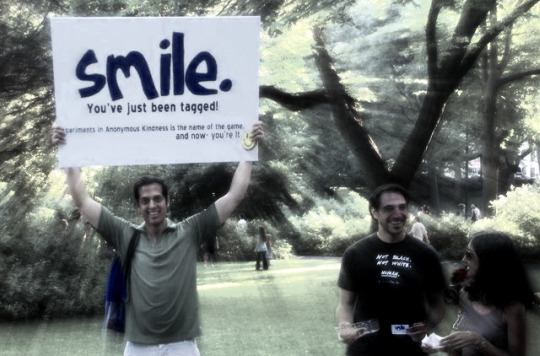
Last week, I mentioned a Forbes article to my 9th grade cousin whose response was to "make sure that the people around me and I are always smiling". Encouraged by that wow-response, I shared it again in the Wednesday circle; and as serendipity goes, Jennifer, in that very circle, mentions that the article was written by her boss -- Ron Gutman. It makes you smile, particularly since the article itself is about smiling. :)
During a grueling segment of a long-distance run, Ron cracked a smile and noticed that he instaneously felt better. Could it be as simple as that? In a 2009
study in Germany, scientists measured brain activity before and after injecting botox to suppress smiling muscles; they discovered that just facial feedback of smile (even a fake one) activated our neural circuitry of happiness. It backed up Darwin's
Facial Feedback Response Theory. Furthermore, British researchers concluded that one smile can provide same level of brain stimulation as
2,000 chocolate bars, or receiving $25 thousand in cash. All of a sudden, Thich Nhat Hanh's quote makes a lot of sense: "Sometimes your joy is the source of your smile, but sometimes your smile is the source of your joy."
Smiling is very natural. Surprisingly, we are actually born smiling and ultrasounds show that babies appear to smile even in the womb. Children smile as many as 400 times a day. While that decreases as we age, unfortunately, :) 30% of us still smile more than 20 times a day. By reducing stress hormone levels like cortisol, and increase health and mood enhancing hormone levels like endorphins, and lowering blood pressure, smiling is documented to be therapeutic. When anyone smiles, our facial muscles are suppressed and we smile back -- as two studies in Sweden confirmed. Not only that, when researchers in France asked people to differentiate between real and fake smiles, their judgment was totally imapaired when they had a pencil in their mouth (ie. when their bodies couldn't mimic the smiles they saw). Paul Ekman, the world's leading expert on facial expression, discovered that smiles have the same meaning across all cultures, languages, and even time.
If you're still not convinced, smiling even correlates to performance. A 30-year
study at UC Berkeley examined the smiles of students in yearbook photos and found that widest smilers consistently had the most fulfilling marriages, scored highest on happiness and well-being tests, and were the most inspiring for others. In 2010, Wayne State University project
showed something even more surprising: Major League Baseball players who didn't smile for their baseball cards lived an average of 72.9 years while those beaming smiles lived for 79.9 years! At Penn State, another study confirmed that when we smile, we are not only likeable and courteous, but we're actually perceived to be more competent. Even sending someone
emoticons creates an impact.
So just smile. Right now. :)
While reminding us to
smile a lot, Thich Nhat Hanh also adds: "Each day 40,000 children die of hunger. The superpowers now have more than 50,000 nuclear warheads, enough to destroy our planet many times. Yet the sunrise is beautiful, and the rose that bloomed this morning along the wall is a miracle. Life is both dreadful and wonderful. We have to be in touch with both aspects."
In a study published this month, scientists tracked a group of
bus drivers for two weeks, since they were forced to give out frequent smiles; it turns out that on days when the smiles were forced, the subjects’ moods deteriorated. An inauthentic smile to hide unhappiness doesn't work. Plus, researcher In New Zealand
showed that we can pick up the difference between a fake and genuine smile, and it affects how much people trust and cooperate with us. Paul Eckman and Richard Davison define a real, spontaneous smile as the
Duchenne smile, sometimes called the D-smile, that is different from a
social smile. Maybe this is the kind of smile that is aware of the joys and dreads of life, and chooses to honor the good. I call it a D-smile too -- Deep-Smile.
When my cousin originally emailed me, I wrote back: "The first step in service to smile when you're happy, next step is to be more aware so you can find more reasons to smile, third step is to help others smile and realize that you inevitably smile when others smile, and last step is to be able to smile no matter how good or bad your circumstances are."
So try a smile, maybe a Deep Smile. It's either that or 2,000 chocolate bars. :)




On Apr 5, 2011 Trishna wrote:
Just reading this made me smile :) I can definitely confirm that babies are born smiling as we have photos of Sareena smiling when she was only 12 hours old and she continues to flash umpteen smiles a day as a 3-month old, which in turn makes her parents smile -- isn't it wonderful that smiles can be so contagious!?! Thanks for sharing such a wonderful piece :)
Post Your Reply